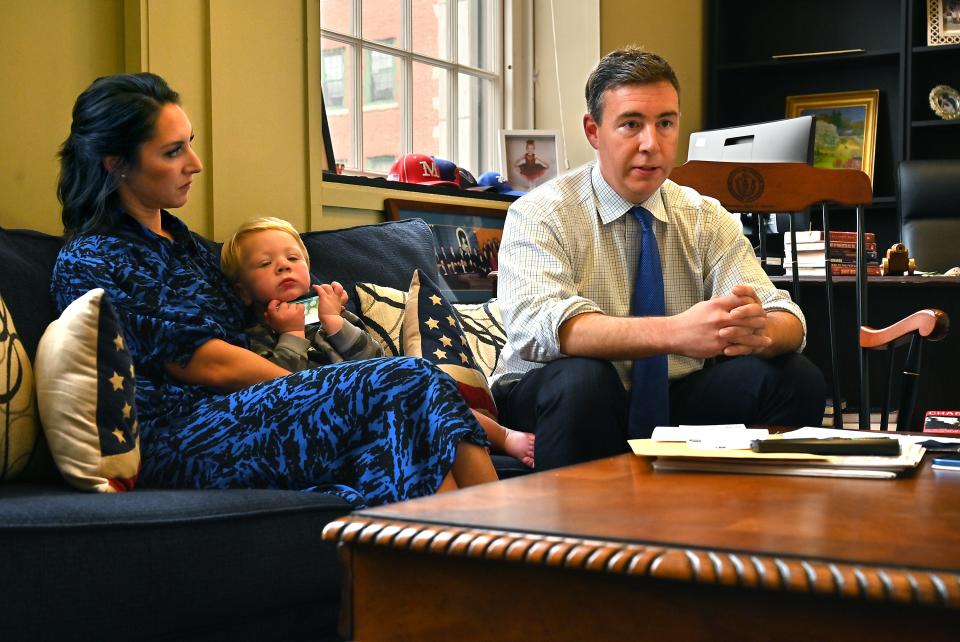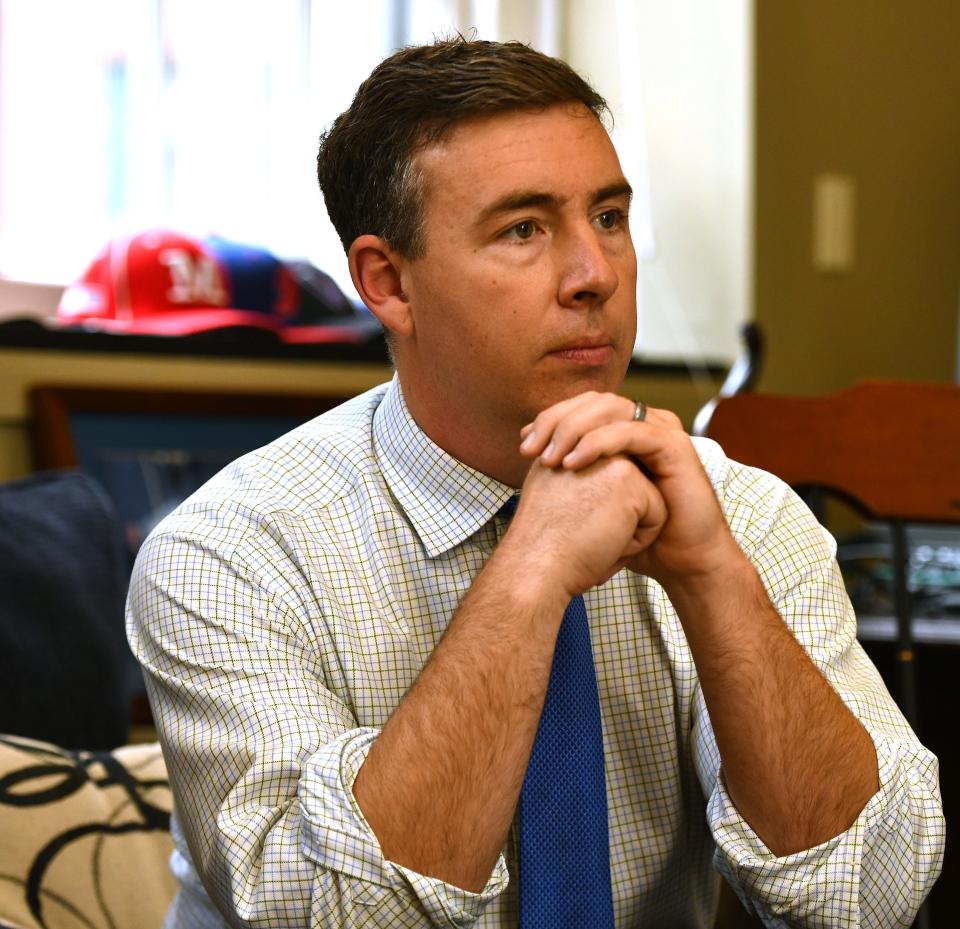Ryan and Stephanie Fattman agree to record fines to settle campaign finance cases
- Oops!Something went wrong.Please try again later.
BOSTON — The Massachusetts attorney general announced Tuesday that her office had reached a settlement with Sen. Ryan Fattman, his wife, Worcester Registrar of Probate Stephanie Fattman, and members of their campaign committees in the three-year probe into campaign finance irregularities.
“Enforcing our campaign finance laws, and holding those who violate them accountable, are critical functions of our office,” said Attorney General Andrea Campbell. “We will continue to hold accountable those who misuse positions of power, break the law and undermine the public’s trust.”
The settlements include Fattman's father, Donald Fattman, for his actions taken as treasurer of the Ryan Fattman Committee; the Republican State Committee; the Sutton Republican Town Committee; and his brother Anthony Fattman for actions taken as chair of the Sutton Republican Town Committee. The settlement resolves allegations that each person or entity violated state campaign finance laws during Stephanie Fattman’s campaign for reelection as registrar of probate in 2020.

According to the attorney general the probe revealed that in 2020, Sen. Fattman’s campaign donated money to the Republican State Committee and the Sutton Republican Town Committee, which used the money to fund over 550,000 mailers in support of (and made other in-kind donations to) Stephanie Fattman’s campaign. These contributions, totaling more than $160,000, of which $137,000 flowed through the Republican State Committee, far exceeded the legal limit $100 on contributions from one candidate to another.
Stephanie Fattman and the Stephanie Fattman Committee have agreed to disgorge the full amount of the impermissible contributions funneled to the Stephanie Fattman Committee through the Republican State Committee, or $137,000. The committee will relinquish all current assets and make four annual payments of $27,000 to make up the difference.
Sen. Fattman is required to pay $55,000 and Donald Fattman, former treasurer of the Ryan Fattman Committee, is required to pay $10,000. The Sutton Republican Town Committee also entered into an agreement and has paid the remains of its committee bank account to the state, totaling $5,211.48. As part of the agreement, Anthony Fattman will resign immediately. He is prohibited from serving as chair in the future.
As outlined in the agreements, both Stephanie and Ryan Fattman will retain professional compliance agents to ensure that their campaigns comply with all campaign finance laws through the 2026 primary and general elections.
“OCPF will continue its role in educating and informing candidates of their duties and responsibilities under the campaign finance law,” said OCPF Director William Campbell. “Where apparent violations exist, the agency will take measures to ensure the public’s interest in accurate and timely disclosure of campaign finance activity.”
The payments by the campaign committees of Registrar Fattman and Sen. Fattman represent the largest amounts ever paid by candidate committees to the state to resolve alleged campaign finance violations.
Last month, the Massachusetts Republican State Committee agreed to pay a fine of $15,000, in three installments, as part of its settlement into the attorney general's probe of alleged campaign finance irregularities. The Fattmans have agreed to pay $55,000 to the state through the office of director in the Office of Campaign and Political Finance.
“We’re happy to move forward and put this behind us,” said Stephanie Fattman, in an interview Friday at Sen. Fattman's State House office, where they were accompanied by their youngest son, Grady, 2. “Our daughter was 4 when this started, now she’s 7, and we didn’t have this little one.”
“There was no finding of liability, no admission of wrongdoing,” Ryan Fattman said Friday.

“I don’t want to be distracted from other issues,” he continued, referencing the migrant issue and the governor’s response to the influx, and the firearms bill that was recently passed by the House and awaits action in the Senate.
“The special election (to fill a vacant Worcester and Hampshire District Senate seat) is a huge test for the Republican Party in Massachusetts,” Ryan Fattman said, contending that Massachusetts would benefit with more balance in the State House, a true two-party system that increases accountability and transparency. “It’s time to get all our oars in the same boat and in the water.”
In his own words: Sen. Ryan Fattman
Ryan Fattman said he considers the campaign finance investigation political payback for his opposition to changing the way the director, also known as the regulator, of the Office of Campaign and Political Finance is appointed. Changes were proposed in 2019 that Fattman believes would have nullified Republican input in the selection and appointment process.
“Now, there are four people who have a veto: the chairs of the respective political parties, the secretary of state and the dean of a Boston-area law school,” Fattman said, explaining that he believes the changes proposed by the Senate would have effectively cut the Republican out of the equation.
“I helped defeat that provision,” Fattman said. That defeat, Fattman alleges, led to his being targeted, and to the retirement of the director, Michael Sullivan, at the time. “I feel it was political payback. The regulator was not reappointed; the chair of the Republican State Committee did not want to reappoint him.”
Sullivan was first appointed to the directorship of the office in 1994, and was subsequently reappointed through 2018 to a fifth term that, if completed, would have ended in 2024. The longtime director had retired in December 2019. He was recalled to service in 2020 at the start of the COVID-19 pandemic because the state could not find a successor. He worked through April 2021 until the appointment of Campbell.
He disputed Fattman's claim that the probe into the Fattman family's campaign accounts prompted his retirement.
"Everyone was aware that I was planning to retire, and the amendment the senator was referring to would have had zero impact on my career," Sullivan said. "I did the job for 27 years; I didn't care if someone was a Democrat or a Republican." He pointed to the John Buonomo case, the former Middlesex County register of probate who was convicted of stealing money both from his campaign account and state copy machines, and the Dianne Wilkerson case, the former Boston senator who pleaded guilty to bribery charges and spent two years in prison.
The activity uncovered in this case took place in 2020, after I was asked to return on an interim basis," Sullivan said. "Realistically, no candidate settles a case for the kind of money involved here unless they are aware that their actions violate the law," Sullivan said. "It's very clear what happened in this case, and I am pleased that the AG pursued it to a conclusion."
In discussing the events, Fattman said that Sullivan called the senator into his office Jan. 7, 2021, saying he believed Fattman had violated the law that limits direct campaign contributions from one candidate to another to $100 maximum. He described the meeting as “informal” and laments that it was not recorded.
The senator said Friday that contributions from campaigns to state party committees are unlimited and that the committees have a right to spend that money, in kind, on other candidates running for office. In 2020, Fattman was running unopposed and he felt he could contribute to elect other Republicans into office.
“The point is to get people elected,” Fattman said.
“Once the donation is made, the candidate has no control over the funds; the money can be spent on any other candidate,” Fattman said, adding politicians on both sides of the aisle engage in the practice.
The Fattmans joined with members of their namesake political committees and filed a lawsuit in March 2021 against Sullivan, attempting to block him from forwarding any evidence to the state attorney general.
“We didn’t sue to hide what was going on, but to bring light to (Sullivan's) actions and get it out from behind closed doors,” said Stephanie Fattman.
The lawsuit was rejected by Suffolk Superior Court Judge Christine Roach, allowing the investigation to continue.
This article originally appeared on Telegram & Gazette: Sen. Ryan and Stephanie Fattman to pay fines in campaign finance case

